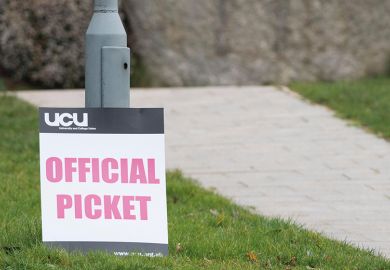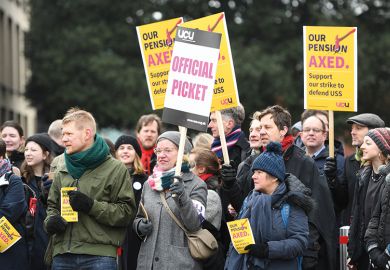Events in the past week have brought to a head very real concerns among members throughout the country as regards the USS valuation.
However, it concerns me that the debate that we have witnessed has led to some misunderstandings among members of the trustee’s position. I would like to take the opportunity to address some of these in turn.
“The USS is being managed under the assumption that sponsoring employers could go bankrupt at any time”
The scheme’s funding position does not assume that all sponsoring employers become bankrupt. This assertion fundamentally misrepresents our approach to managing risk and how we fund the scheme.
In fact, the truth is quite the opposite: we actively take the employers’ collective financial strength into account and rely on their continued existence and ability to support the scheme over multiple decades.
In doing so, we do need to be confident that we could ask for higher contributions from employers in future if the investment returns that it expects to achieve do not materialise.
The risk that those contributions would put a demand on employers that would divert resources away from their core missions or, in extremis, threaten their ability to invest and sustain themselves, is the key factor in setting the funding requirements.
For the valuation, we have to put a cost of paying an insurer to take on all of USS’ liabilities (the buyout basis) – and this would be about twice the value of the scheme’s current assets and generate a deficit considerably greater than the one we have arrived at.
“The USS is being overly prudent”
Employer and member contributions are invested to fund future pensions. The level of investment return that we can reasonably expect from them in future has a strong influence on the ability to fund pension promises already made and whether a given level of pension can continue to be offered without jeopardising the sustainability of the scheme.
Our updated funding assumptions – arrived at after a thorough, independent review – have actually reduced our liabilities. Had we simply maintained the position from the 2014 valuation, the funding deficit would be almost twice what we estimate it to be today.
Most notably, we expect real interest rates will revert to historic norms sooner than is currently priced into the market. That is far from pessimistic. Indeed, some (including the Pensions Regulator) have questioned whether we have been too optimistic.
The unavoidable fact is that market conditions have changed since 2014. Real interest rates have fallen since 2014, relative to inflation, and asset prices have soared.
The USS is unique in many ways, but not as it pertains to the principles of economics and financial markets. We are now having to pay more – to get less in return – than we expected in the past.
Such conditions have increased the estimated cost of accruing USS’ defined benefits in their current form by a third, and present a funding deficit in respect of past promises.
This is an issue that the trustee is legally bound to address through the current valuation, as we are required by law to demonstrate every three years that the scheme is sustainable.
“The USS has not shown its working”
Perspectives on this valuation will vary, but our conclusions on investment risk and returns (and, in turn, the funding position) have followed 24 months of engagement with employers, member representatives, the Pensions Regulator and independent advisers.
We’ve endeavoured to conduct one of the most transparent, albeit complex, valuations of any UK pension scheme to support a wider understanding of the challenges that we, and all open defined benefit pension schemes, face.
We have held briefings at institutions throughout the country to engage with employers on the trustee’s approach and considerations. Employer and member representatives have received detailed reports on covenant, methodology, valuation assumptions, interest rate reversion, expected investment returns on assets, discount rates, short-term reliance and mortality.
This is far more engagement than any pension scheme that I have encountered in my career prior to working for the USS.
“The scheme is in surplus; there is no deficit”
Estimating future expected investment returns is the most significant assumption that we make in a valuation, as they are used to “discount” the value of the scheme’s liabilities.
Our best estimate – based on our approach to risk and the associated investment strategy – would, indeed, result in a surplus.
But, by definition, this only has a 50/50 chance of our funding assumptions being right (or better). To run the scheme responsibly and be compliant with legislation, we have to apply a degree of prudence and, as a result, we have a funding deficit.
“The USS can be treated differently to other pension schemes”
The USS has many strengths, but it is not immune to the economic and legislative challenges faced by all open defined benefit pension schemes – and to suggest otherwise would be a disservice to members.
We are committed to providing secure pensions but, ultimately, that security comes from the collective strength of our sponsoring employers and their ability to sustain the scheme and the inherent risks involved. That is true of any defined benefit pension scheme.
Sometimes, when the world changes around us, this presents very difficult questions. I have taken no pleasure in presenting these questions to the University and College Union and Universities UK through the Joint Negotiating Committee.
But I can assure members that our objective, balanced and informed conclusions have been based on detailed, independent analysis and modelling, and overseen by the UCU and UUK appointees, who sit alongside independent experts on the Trustee Board.
They conform to our legal and regulatory responsibilities to protect the pensions that members have already earned and ensure that future promises are secure.
Bill Galvin is group chief executive officer of the Universities Superannuation Scheme.
Register to continue
Why register?
- Registration is free and only takes a moment
- Once registered, you can read 3 articles a month
- Sign up for our newsletter
Subscribe
Or subscribe for unlimited access to:
- Unlimited access to news, views, insights & reviews
- Digital editions
- Digital access to THE’s university and college rankings analysis
Already registered or a current subscriber?







